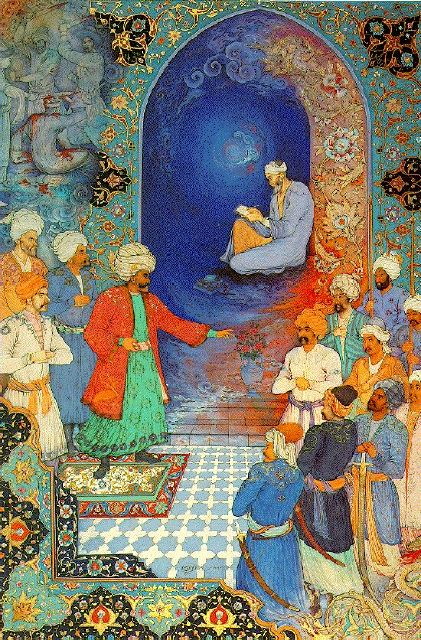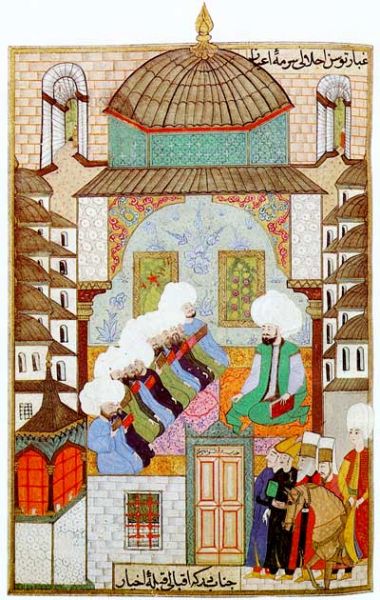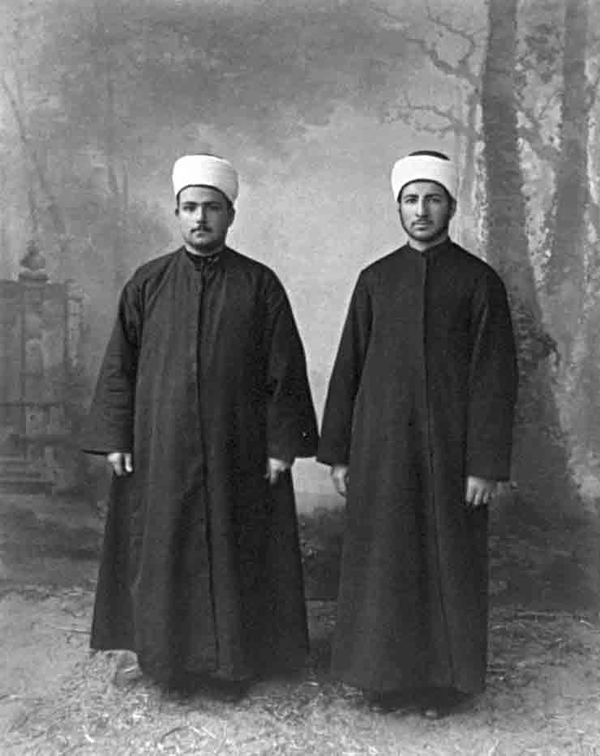
THE INTELLECTUALLY ELITE: STUDENTS OF MADRASAS
Could you describe the culture of the Middle Ages and the role of madrasas during this period?
The Middle Ages was not a dark age as it is commonly believed, especially not for Muslims. Universities were established during this era, and later spread to the entire world through Muslims. The same applies to paper. Literature, law, theology, and philosophy were taught in universities. In madrasas, philosophy was replaced by wisdom. Because in Islam, there is no place for philosophy. Philosophy is the activity of the mind, while religion is transmitted knowledge. However, in understanding the truth of non-religious matters, there is a place for philosophy. They called this natural wisdom. Physics, chemistry, biology, and astronomy were all studied within this framework. Mathematics, especially geometry, was taught within the framework of logic as part of the instrumental sciences of religion. The madrasa was the most important place directing society. Knowledge is power, even a weapon.

ISTANBUL UNIVERSITY ESTABLISHMENT DATE: 1453
How can we explain the forgetting of madrasas while today European universities boast about their roots and traditions?
The preference of society has changed. The culture represented by madrasas has been abandoned. Consequently, madrasas were neglected, and then it was decided that they would not meet the needs of society. Then, on the grounds that they were elements of an outdated world, they were abolished. Now, if you go and look above the main door of Istanbul University, you can clearly see that it says "established in 1453." Don't people ever wonder about the first building, the special robes, the original name? The Ayasofya Madrasa, founded by Sultan Mehmed II in 1453, was the original establishment. It was demolished in the 1930s to make room for tourist buses to park. The madrasa's mosque was turned into a museum. Istanbul University was established in 1933. The newly found republic couldn't even tolerate the name and traditions of the Dar al-Funoun, established by the Ottomans in the 1870s. Madrasas should have remained. They could have easily adapted to the times. In fact, in the last years of the Ottoman Empire, madrasas were reformed. The lessons taught at the qadi (judge) madrasa, called the Maktab-i Nuvvab, which was opened in 1854, were more advanced than those at the School of Law. Qadis from madrasas were more knowledgeable, skillful, and respected than judges from other schools at that time.
CENTERS OF ATTRACTION FOR MUSLIMS
Did madrasas succeed in becoming the cultural centers of the Islamic world?
Cities like Istanbul, Damascus, Cairo, Bukhara, and Kazan, where major madrasas were located, became centers of attraction, drawing Muslims from all over the world to come for education. They produced ideal intellectuals who were informed about each other but still preserved their cultural differences. Now, there are still some madrasas in certain cities, but it seems that their former brilliance has faded. Today, cultural centers are more or less limited to a circle of students and teachers who have delved into the realms of knowledge to some extent."
COLLEGE MEANS KÜLLİYE
Could you describe madrasa education?

The curriculum followed the framework of medieval tradition and differed from today's education. It aimed not to overload students with information but to teach them where to find accurate knowledge and how to analyze it. Small books were read. One-on-one instruction was crucial. The teacher penetrated the heart of the students, discovered what they needed, and tailored the education accordingly. In a madrasa, there were no "students," only individual learners. The building was functional. It was a complex (in Turkish, Külliye) with a mosque, library, kitchen, clinic, pool, and garden. The student lived and studied there, detached from their family and hometown, fully immersed in the world of knowledge. This way, they not only acquired knowledge but also developed a madrasa identity. In England, universities also adopted madrasa architecture. Moreover, at least in the first year, the student had to live there. The living quarters were referred to as a college (in Turkish, Kolej). It's said that this word is derived from "külliye." The student's prayers, cleanliness, manners, behavior, attire, and eating habits were all supervised. They learned both knowledge and etiquette.
MADRASAS TRAINED BUREAUCRATS
Which areas of government employment were madrasa graduates employed in? What role was given to madrasa graduates in the transition to the new system?
Before the Ottomans and in the early days of the Ottoman Empire, all kinds of government positions were held by graduates of madrasas. Outside of madrasas, only someone very charismatic, highly virtuous, noble, and of course, lucky could attain a government position. As time progressed and bureaucracy required specialized technical knowledge, the Ottomans reserved these positions for those trained specifically in the palace. Madrasas began to train individuals for services in religious affairs, judiciary, and education. They were called "ulama al-rusum," meaning scholars who served in official capacities. During the Republic era, madrasa graduates of old Turkey constituted the most intellectual segment of society. They were employed in various positions, from teaching to judging, provided they demonstrated loyalty.
LEVEL OF SOCIETY SUDDENLY DECLINED
For the development and continuity of a civilization, it must adhere to its sources. What role did madrasas play in our civilization's history?
They formed a strong community adhering to the Sunni tradition, tightly bound to tradition, assuming leadership positions in society, capable of limiting rulers when necessary, and possessing class consciousness. They constituted an elite class who spoke eloquently, dressed well, had refined tastes, lived in beautiful homes, appreciated aesthetics, understood literature, and were witty and charming. These scholars, often acting as protectors of the Sharia, stood against those who committed injustice or deviated from righteousness, whether they were from the public or rulers pursuing worldly desires. The public sought refuge behind them. When the scholars were removed, the moral level of society suddenly declined.
THEY WERE ASTRONOMERS
What was the role of the scholars in political life, state affairs, and society?
The scholars played various roles in political life, state affairs, and society. They served as bureaucrats, judges, teachers, imams, sermonizers, preachers, doctors, and astronomers. They held positions of respect throughout society and could prevent disturbances with their strong personalities. There were no headmen for the neighborhood or the village; instead, the state engaged with the imam, who sometimes acted as a mediator between the people and the state. Madrasas instilled class consciousness in the scholars and ensured the removal of rotten apples and ill-intentioned individuals. The madrasas grounded the scholars, making them confident and self-assured. Since madrasas were waqf (foundation) institutions, they were immune from any kind of pressure or influence. If a qadi complained of pressure or feared the responsibility of making judgments, they could resign and become a teacher, earning a livelihood from this. In fact, many people preferred the modest salary of teaching over the highly gossiped-about position of being a qadi. Qadis did not receive salaries; they sustained themselves from court fees. An imam received their salary either from waqfs or from the people. Madrasas, being waqf institutions, were not official establishments, and thus, no one could exert pressure on them. Teachers also received their salaries from there.
Önceki Yazılar
-
TRACES OF ISLAM IN CONSTANTINOPOLIS7.01.2026
-
WHO CAN FORGIVE THE KILLER?31.12.2025
-
WHEN WAS PROPHET ISA (JESUS) BORN?24.12.2025
-
IF SULTAN MEHMED II HE HAD CONQUERED ROME…17.12.2025
-
VIENNA NEVER FORGOT THE TURKS10.12.2025
-
THE FIRST UNIVERSITY IN THE WORLD WAS FOUNDED BY MUSLIMS3.12.2025
-
WHO BETRAYED PROPHET ISA (JESUS)?26.11.2025
-
IT HAS BEEN MORE THAN 100 YEARS SINCE ITS ABOLITION, BUT... IS THE CALIPHATE BEING REESTABLISHED?19.11.2025
-
GREETINGS TO YOU, O OTTOMAN SANJAK!…12.11.2025
-
ROTHSCHILDS BROUGHT THE END OF THE OTTOMAN EMPIRE!5.11.2025